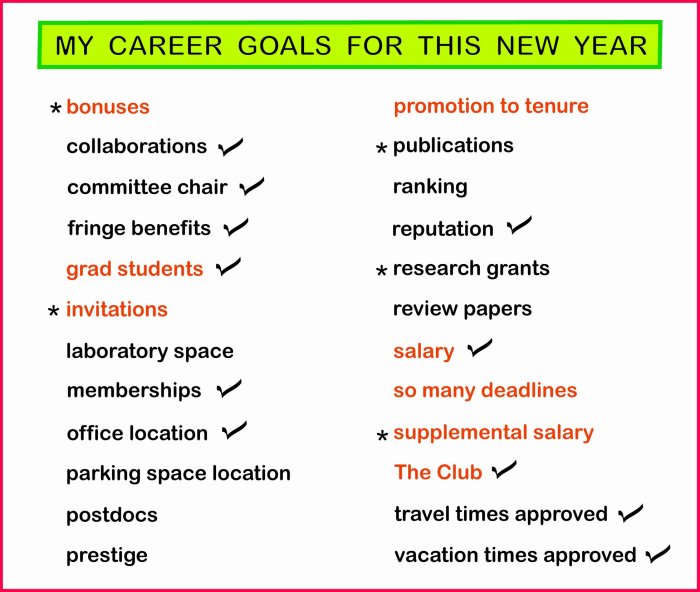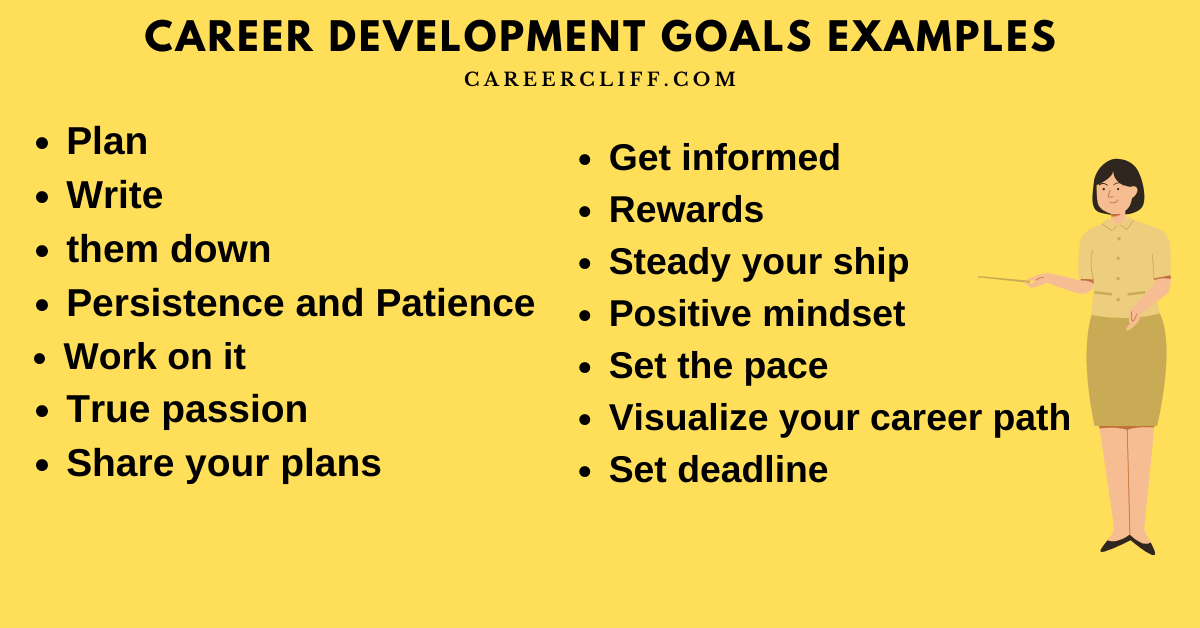Career Development Goals are the roadmap to professional success, guiding individuals towards their desired future. From setting clear objectives to overcoming obstacles, this journey is all about growth and achievement.
Importance of Career Development Goals
Setting career development goals is crucial for professional growth as it provides individuals with a roadmap to success. By clearly defining what they want to achieve in their careers, individuals can stay focused, motivated, and proactive in their professional development.
Increased Focus and Progress, Career Development Goals
- Clear career development goals help individuals prioritize tasks and make decisions that align with their long-term objectives.
- Having specific goals allows individuals to track their progress, celebrate achievements, and make adjustments when necessary.
- With a clear direction in mind, individuals are more likely to stay committed and persistent in pursuing their career aspirations.
Long-term Success Benefits
- Well-defined career development goals can lead to increased job satisfaction and fulfillment as individuals work towards meaningful milestones.
- Setting ambitious yet achievable goals can push individuals out of their comfort zones and encourage continuous learning and growth.
- By focusing on long-term success, individuals can build a strong professional reputation, expand their network, and open doors to new opportunities.
Types of Career Development Goals

Career development goals can fall into various categories, each serving a specific purpose in advancing one’s professional journey. These categories include skills enhancement, promotions, and career transitions.
Skills Enhancement
Enhancing skills is a common career development goal aimed at improving one’s proficiency in a particular area. This can involve gaining new certifications, attending workshops, or acquiring additional training to stay updated with industry trends.
Promotions
Seeking promotions is another type of career development goal that focuses on advancing to a higher position within the current organization. This goal often involves taking on more responsibilities, showcasing leadership abilities, and demonstrating a track record of success.
Career Transitions
Career transitions involve making a significant change in one’s professional path, such as switching industries, roles, or even starting a new business. This goal requires careful planning, networking, and acquiring the necessary skills for the new role.
Short-term versus Long-term Goals
When setting career development goals, it is essential to consider both short-term and long-term objectives. Short-term goals provide immediate direction and motivation, while long-term goals help create a roadmap for future success and fulfillment.
SMART Criteria for Setting Effective Goals: Career Development Goals
The SMART criteria serve as a guideline for setting specific, measurable, achievable, relevant, and time-bound goals. By using this framework, individuals can ensure that their career development goals are well-defined and actionable.
- Specific: Clearly define what you want to achieve in your career.
- Measurable: Establish metrics to track progress and success.
- Achievable: Set realistic goals that are within reach based on your current skills and resources.
- Relevant: Align your career goals with your overall aspirations and the direction you want your career to take.
- Time-bound: Set deadlines to create a sense of urgency and accountability for achieving your goals.
Strategies for Achieving Career Development Goals
To successfully achieve your career development goals, it is essential to create a well-thought-out action plan, prioritize continuous learning and skill development, and stay motivated even in the face of obstacles.
Create a Detailed Action Plan
- Set specific and measurable goals that align with your long-term career objectives.
- Break down your goals into smaller, manageable tasks with deadlines to track progress.
- Identify the resources and support you need to accomplish each task.
- Regularly review and adjust your action plan based on your progress and any new opportunities or challenges.
Prioritize Continuous Learning and Skill Development
- Stay updated on industry trends, technologies, and best practices through courses, workshops, and networking events.
- Seek feedback from mentors, colleagues, or supervisors to identify areas for improvement and growth.
- Take on new responsibilities or projects that allow you to develop new skills and expand your knowledge base.
- Invest time in personal development activities such as reading, attending seminars, or participating in online forums related to your field.
Stay Motivated and Overcome Obstacles
- Stay focused on your long-term vision and remind yourself of the reasons why you set your career goals.
- Celebrate small wins and milestones along the way to maintain momentum and boost your confidence.
- Stay resilient in the face of setbacks or challenges by learning from failures and adapting your approach.
- Surround yourself with a supportive network of friends, family, or colleagues who can provide encouragement and guidance.
Monitoring and Adjusting Career Development Goals

Monitoring and adjusting career development goals is crucial for staying on track and making progress towards your desired career path. By regularly tracking your goals, you can assess your current position, identify any gaps or areas for improvement, and make necessary adjustments to ensure you are moving in the right direction.
Importance of Tracking Progress
Regularly monitoring your progress towards your career goals allows you to stay focused and motivated. It helps you measure your success, identify any challenges or obstacles, and make informed decisions about the next steps in your career development journey.
Evaluating Current Goals and Making Adjustments
One way to evaluate the effectiveness of your current goals is to assess whether they are still aligned with your long-term career aspirations. If you find that your goals no longer serve your ultimate vision or if external factors have changed, it may be necessary to revise or refine them to ensure they are relevant and achievable.
Examples of When to Revise Goals
- If you have acquired new skills or experiences that open up different career opportunities, you may need to adjust your goals to align with these new possibilities.
- In case you encounter unexpected challenges or setbacks that affect your original career plan, it might be beneficial to reassess your goals and make necessary changes to adapt to the situation.
- When you receive feedback from mentors, supervisors, or peers that suggests your current goals are unrealistic or need modification, it is wise to consider revising them to ensure they are achievable and in line with your professional growth.
